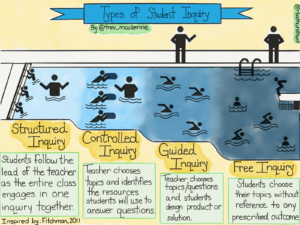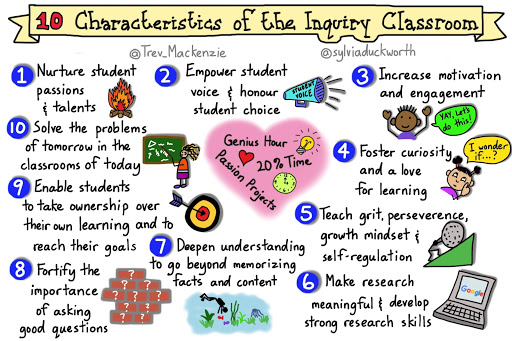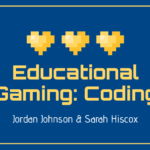Trevor MacKenzie is a local High School teacher, author, and consultant that focuses on a student-centered approach to learning: inquiry. Inquiry based learning is something that I have increasingly become interested in since diving into the education program and Trevor had a lot of really useful information to help guide my own practice. Here are some highlights from his presentation today.
What is Inquiry Based Learning?
Inquiry based learning is a pedagogy that values agency and competency. As teachers we can start to build an inquiry mindset with our students by drawing out their prior knowledge with the use of questioning, collaborating on new understandings together, appropriately scaffolding their learning, and ultimately releasing our participation in their learning process. Inquiry based learning is a process that increases student engagement, agency, and promotes a lifelong love of learning.

The Four Stages of Student Inquiry
Graphic created by Rebecca Bathurst Hunt & Trevor MacKenzie
Common Misconceptions with Student Inquiry?
Trevor MacKenzie touched on 2 common misconceptions within a student-led, inquiry based classroom:
- All inquiry must be free inquiry and that free inquiry is ‘the best’– Free inquiry, as outlined above, is the ‘final stage’ of student centered learning. Many people hold the misconception that-all inquiry must be free, in order to be successful. This is not always the case. Trevor spoke on the fact that deep learning can happen at any (and all) stages of student inquiry and that an inquiry based approach takes time-it is a layered process.
- Inquiry based classrooms are a ‘free for all’– Trevor stressed the importance of inquiry as a shared process. As a teacher you cannot throw your students ‘into the deep end’ of inquiry without first giving them the tools to increase their competency and agency. Student led inquiry allows students to have agency over what they learn, which increases their engagement, motivation and focus.
So, How Can We Introduce Inquiry into Our Classrooms?
First, we must nurture our students natural curiosity and talents. Ask them what they are interested in, engage with their prior knowledge, and present a language they can use to enrich their learning experience. One way to do this is through the use of provocations.
What are Provocations?
Provocations are open-ended activities or materials provided by a teachers, with no prescribed outcome. They are used to inspire creativity, curiosity, and engagement with ideas. Examples of provocations are:
- Hands on activities
- Guiding Questions
- Gif’s
- Videos
- Artifacts
- Visuals
- Field Trips
- Play opportunities
Trevor discussed creating topics and eliciting discussion on what students are observing, experiencing, and wanting to learn. He discussed the use of 3 prompts that can deepen the thought process when approaching inquiry through the use of provocations.
- What do you notice?
- What do you wonder?
- What do you know?
These 3 questions can foster student engagement and understanding, while highlighting their prior knowledge. Trevor also stressed the importance of keeping inquiry based learning relevant. Students want to learn what interests them. It is our job as educators to motivate and inspire students to learn, and remaining relevant and authentic aids in this process.
Inquiry based learning is empowering and engaging. It honors student agency, curiosity and motivation. I hope to adapt many inquiry based approaches to my future classrooms and I look forward to learning more about, and engaging with, inquiry based practices.
Sources:
Trevor MacKenzie: https://www.trevormackenzie.com/





